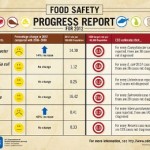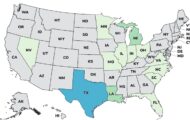The Center for Science in the Public Interest has released a list of meat and poultry products that have the greatest risk of causing foodborne illness outbreaks. They studied 12 years of outbreaks from meat and poultry that occurred in the U.S. from 1998 to 2010. Only illnesses linked to outbreaks that were definitively attributed to meat or poultry product were used in the analysis. The Centers for Disease Control and Prevention (CDC) state that 48 million Americans contract some sort of foodborne illness every year, but most are not known because they are either "sporadic", not linked to an outbreak, or are not diagnosed or reported to public health officials. The vast majority of foodborne illnesses don't require medical attention. And of the illnesses that do require medical … [Read more...]
Snapshot of Foodborne Illness Trends in US
The Centers for Disease Control and Prevention (CDC) has released a snapshot of the report card for food safety issued by FoodNet. This data helps public health officials know how much progress (or lack of progress) has been made in reaching goals for reducing foodborne illness. Those goals, enumerated at HealthyPeople.gov, state that the objectives are to reduce infections caused by bacteria and viruses transmitted through food. More specifically, the government is working toward reductions in infections due to STEC bacteria, Listeria, and Salmonella in beef, dairy, fruit, nuts, leafy vegetables, and poultry. They also want to prevent an increase in the proportion of Salmonella and Campylobacter isolates that are resistant to antimicrobial drugs. Finally, increasing the proportion … [Read more...]
Study Examines Treatments for Microbial Contamination in Sprouts
A study published int he April issue of the Journal of Food Science looked at seed disinfection treatments of sprouts. In the last few years, there have been several major foodborne illness outbreaks linked to raw sprouts, including an E. coli outbreak linked to clover sprouts served at Jimmy John's restaurants that sickened 29 people in 11 states. And there were seven recalls of sprouts for pathogenic bacterial contamination. Sprouts are problematic for several reasons. First, the bacteria can be encapsulated inside the seed, making it impervious to physical disinfection such as the application of calcium hypochlorite. And the seeds are sprouted in warm, moist conditions, which are ideal for bacterial growth. The FDA released guidelines in 1999 designed to limit this problem, … [Read more...]
When Good Food Goes Bad: The Recommendations
The Center for Biosecurity of UPMC has developed a report on strengthening the U.S. response to foodborne illness outbreaks. Since 40,000,000 people in this country get sick from foodborne contaminants every year, causing 128,000 hospitalizations and more than 3,000 deaths, some improvement to the current system is warranted. For the first part of this story, see When Good Food Goes Bad: The Problems. After detailing ten major issues with the current foodborne illness prevention and surveillance system, the authors have developed five recommendations. First, they say that the government should fund the development of next-generation technologies for rapidly diagnosing foodborne illness. Those tools need to incorporate culturing pathogens so that facilities such as PulseNET can keep … [Read more...]
When Good Food Goes Bad: The Problems
The Center for Biosecurity at the University of Pittsburgh Medical Center has released a report titled "When Good Food Goes Bad: Strengthening the U.S. Response to Foodborne Disease Outbreaks." It is designed to improve the country's ability to respond to large foodborne illness outbreaks. The authors identify emerging trends in outbreak response and recommend ways to accelerate and strengthen public health reaction to these outbreaks. For part two of this story, see When Good Food Goes Bad: The Recommendations. There are ten major findings in the report. The first is that medical expenses and lost productivity cost this country more than $77 billion every year. And that the level of resources devoted to "preventing and responding to such outbreaks" is very small in comparison. They … [Read more...]
Children More Likely to Suffer Foodborne Illness
A new study published in the Pediatric Infectious Disease Journal has shown that children who are younger than five years of age are more likely to suffer from foodborne illness than adults. The study looked at data from Prevention's Foodborne Diseases Active Surveillance Network (FoodNet) and the CDC. Children are automatically included in the high risk groups for foodborne pathogens, along with the elderly, those with chronic illnesses, and those with compromised immune systems because their immune systems are underdeveloped. The study's authors thought that the higher rates of illness among children may be explained by "higher rates of medical care-seeking and stool sample submission in this age group." But the illness rates for children were higher even after adjusting for under … [Read more...]
Food Safety Attorney Fred Pritzker: Produce Testing Cuts Unwise
Food Safety Attorney Fred Pritzker discussed how cuts in produce testing will affect food safety with Minnesota Public Radio's Cathy Wurzer on Friday morning. Funding for the Microbiological Data Program (MDP) has been cut, so the program will cease to exist after December 31, 2012. What kind of affect will this have on food safety? Not a good one, Pritzker sad. "We know people will be sick becasue of this action," Pritzker said. "Why would we be doing that?" The Microbiological Data Program (MDP) is a national foodborne pathogen monitoring program that was cerated in 2001. Operated by the US Department of Agriculture (USDA), the program basically brought the USDA's meat and poultry monitoring program to produce. At a cost of about $4 million per year, MDP worked in … [Read more...]
For National Food Safety Month, Common Food Safety Myths Debunked
September is National Food Safety Education Month. And several organizations are offering information to help consumers stay safe by using good practices in the kitchen and by debunking food safety myths. The consumer shares responsibility with producers and distributors for food safety. Home cooks must know proper food handling and cooking techniques, because pathogenic bacteria can be present on all foods. The National Chicken Council is partnering with Partnership for Food Safety Education to inform the public about some common myths. Since one in six Americans will get a foodborne illness this year, consumer education is critical. These are some of the myths advocates are debunking: "Microwaves kill bacteria." Microwaves do not kill bacteria; the heat that microwaves generate … [Read more...]
Food Safety Guides for Those Most Vulnerable to Foodborne Illness
The USDA and the FDA have partnered to create six booklets with food safety advice for those who are most at risk for serious complications of foodborne illness. The booklets are tailored to older adults, transplant recipients, pregnant women, and people with cancer, diabetes, or HIV/AIDS. USDA Under Secretary for Food Safety Dr. Elisabeth Hagen said in a press release, "These booklets are a much needed resource for consumers who are at increased risk of getting sick from food. The clear, understandable information in these booklets will help at-risk individuals feel confident about the safety of foods they prepare and eat. The booklets are also helpful to physicians and other health care providers for educating their at-risk patients about foodborne illness." Each booklet has 24 … [Read more...]
Problems Persist With Chicken Jerky Dog Treats From China
Chicken Jerky dog treats imported from China continue to pose serious health problems for American dogs. But despite five years of research and testing, it's not clear why, according to the latest product safety update from the U.S. Food and Drug Administration (FDA). In the July 18 update, the agency stops short of telling consumers not to feed the treats to their pets, but urges people who choose to do so to watch their pets for tellltale signs of serious illness: decreased appetite and activity, vomiting, diarrhea, and an increase in water consumption and urination. The dried chicken products are sold as "jerky," "tenders," "strips" or "treats." The FDA's Center for Veterinary Medicine (CVM) has ben receiving complaints of canine illness associated with chicken jerky treats … [Read more...]













